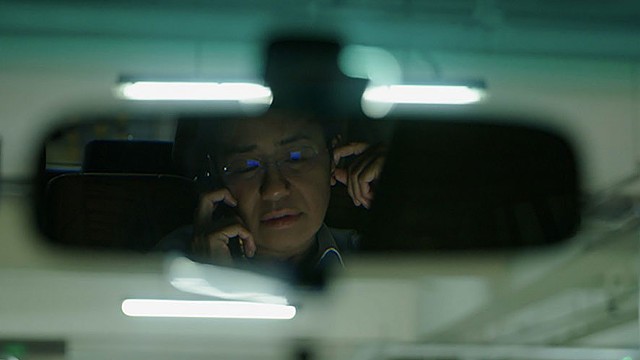
- Courtesy Of Frontline Pbs
- LONG DAY's JOURNEY A reporter's job is never done in Diaz's documentary about an indefatigable voice for government accountability in the Philippines.
Our streaming entertainment options are overwhelming — and not always easy to sort through. This week, I previewed one of the offerings of this year's all-virtual Vermont International Film Festival. A Thousand Cuts will stream on October 31 and November 1; a related live Q&A on November 1 at 8 p.m. features journalist and documentarian Bill Lichtenstein and Emmy winner Van Dora Williams. For more information, see this week's "State of the Arts" and vtiff.org.
The deal
Elected president of the Philippines in 2016, popular nationalist leader Rodrigo Duterte has overseen the extrajudicial killings of thousands of suspected drug users and dealers, according to Human Rights Watch. In the words of Maria Ressa, founder and CEO of the Philippine news outlet Rappler, under his leadership, "The war on drugs became a war on the poor."
For her efforts to hold the government accountable, Ressa has drawn intense online hatred, been arrested several times, and been fêted in the U.S. and made a Time 2018 Person of the Year. A concentrated bullet of energy, she occupies the center of Ramona S. Diaz's 2020 documentary, which follows Rappler as it covers the 2019 senatorial election.
Will you like it?
Like most modern documentarians, Diaz doesn't feed us context in the form of narration or talking-head commentary. She uses news clips to catch the viewer up on recent Philippine history before tossing us into the world of Ressa and Rappler's other reporters as they respond to a lightning-fast news cycle.
But the strongman rhetoric of Duterte and his allies speaks loudly for itself. At one point, Ronald "Bato" dela Rosa, then director general of the Bureau of Corrections, tells a crowd, "I would kill for the president."
Ressa and her employees — many of whom are female — counter this approach with quiet stubbornness. They simply refuse to stop asking the hard questions, a tactic that has led the president to deem Rappler a "fake news site."
While the film's portrait of Rappler and Ressa is clearly positive, the other side is far from ignored. Diaz spends time with Duterte supporters dela Rosa and Mocha Uson, a pop star and influencer who mobilizes her social media army against Rappler. Through these opposing perspectives, A Thousand Cuts becomes a compelling case study in how social media can subject reporters to harassment and enable a few people, for better or worse, to sway the views of millions.
All the main figures in this drama are a bit larger than life, including Ressa herself. Like the late Ruth Bader Ginsburg, she has a personality that outweighs her unassuming physical presence, and she doesn't mince words. The film's title comes from her summation of the situation in her country: "What we're seeing is death by a thousand cuts of our democracy."
Partially raised in New Jersey, Ressa isn't talking exclusively about the Philippines. "They've created a politics of hate," she says at one point, referring to Duterte and President Donald Trump. Many of her antiauthoritarian sound bites apply equally to the present-day U.S.
The film has a chilling postscript: In June, Ressa was convicted of cyber libel. The New York Times called it "the latest in a series of moves by Mr. Duterte's administration to intimidate the news media." Diaz's doc offers a sobering reminder that a free and independent press can never be taken for granted.
If you like this, try...
The World Is Watching (1988; at VTIFF from October 26 through 28): A Thousand Cuts focuses on the heroism of Ressa and her team in telling the stories their government doesn't want told. But sometimes journalists can't or don't report the full story. Taking the point of view of an ABC News team covering the Nicaraguan Revolution, this doc explores some reasons why.
This Is Not a Movie (2019; at VTIFF from October 23 through 25): A Thousand Cuts captures the whirlwind pace of digital journalism. For an intimate look at a slower, old-school model, watch this doc about Robert Fisk, longtime Middle East correspondent for the Independent, who lives by the credo that "we should be objective and unbiased — on the side of those who suffer."
The Act of Killing (2012; Amazon Prime Video, Kanopy, rentable): At one point in A Thousand Cuts, a woman asks Ressa why she should care about the fate of drug dealers. Ressa recites Martin Niemöller's famous poem "First they came..." as a reminder that violence tends to escalate. This documentary, one of the most chilling ever made, examines the mechanics and aftermath of a state-sanctioned genocide.










Comments
Comments are closed.
From 2014-2020, Seven Days allowed readers to comment on all stories posted on our website. While we've appreciated the suggestions and insights, right now Seven Days is prioritizing our core mission — producing high-quality, responsible local journalism — over moderating online debates between readers.
To criticize, correct or praise our reporting, please send us a letter to the editor or send us a tip. We’ll check it out and report the results.
Online comments may return when we have better tech tools for managing them. Thanks for reading.